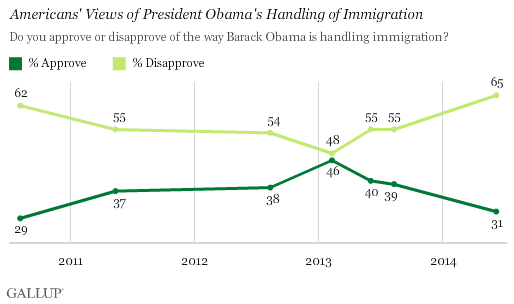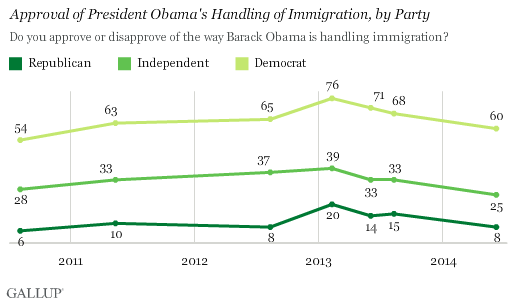6/21/2014


Americans' approval falls eight percentage points since August
WASHINGTON, D.C. -- Americans' approval of President Barack Obama's handling of immigration has dropped to 31%, one of the lowest readings since 2010, when Gallup began polling on his handling of the issue. Meanwhile, two in three Americans (65%) disapprove of his handling of immigration.

These data are from a June 5-8 Gallup poll. Disapproval of the president's handling of immigration has climbed 10 points since August 2013, when more than half of Americans (55%) disapproved.
Recent developments contributing to the ongoing debate about immigration include Obama's delay of a review of deportation policies by the Department of Homeland Security in the hope of striking a legislative deal on immigration reform with Congress. Also, House Majority Leader Eric Cantor's recent primary loss was widely viewed as a defeat rooted in Cantor's perceived stance on immigration. The primary loss and subsequent shakeup in House leadership could spell greater challenges for Obama as he tries to work with Republicans. Additionally, the media has recently enlarged its spotlight on the increasing numbers of unaccompanied Central American children who have crossed the U.S. border, seeking their already immigrated family members and a generally better life.
Obama's approval on immigration has dropped since last August across all political affiliations, even among those in his own party. Democrats' approval has fallen eight points to the current 60%. Approval among independents has also fallen eight points, to 25%. A mere 8% of Republicans approve of the president's handling of the issue, and though this is not their lowest rating on the measure, their disapproval of the president's handling of immigration has reached its highest, at 90%.

Bottom Line
Though Americans largely do not see immigration as a high-priority issue for the president and Congress, Obama has said passing an immigration bill is one of his legislative priorities.
In order to accomplish this feat, he will need the support of congressional Republicans, who could hold both chambers of Congress come January, and who are understandably shaky on the issue after seeing one of their most powerful leaders fall, partly because of his stance on immigration.
For Republicans' part, the composition of their new House leadership and the potential of taking the reins of both houses of Congress could empower them to take ownership of the issue, and make immigration reform a truly bipartisan effort. They will still need the president's signature on any legislation. If they don't make a serious effort to create reform legislation, they could find themselves punished by Latino voters, who tilt Democratic, in 2016.
Survey Methods
Results for this Gallup poll are based on telephone interviews conducted June 5-8, 2014, on the Gallup Daily tracking survey, with a random sample of 1,027 adults, aged 18 and older, living in all 50 U.S. states and the District of Columbia.
For results based on the total sample of national adults, the margin of sampling error is ±4 percentage points at the 95% confidence level.
Interviews are conducted with respondents on landline telephones and cellular phones, with interviews conducted in Spanish for respondents who are primarily Spanish-speaking. Each sample of national adults includes a minimum quota of 50% cellphone respondents and 50% landline respondents, with additional minimum quotas by time zone within region. Landline and cellular telephone numbers are selected using random-digit-dial methods. Landline respondents are chosen at random within each household on the basis of which member had the most recent birthday.
Samples are weighted to correct for unequal selection probability, nonresponse, and double coverage of landline and cell users in the two sampling frames. They are also weighted to match the national demographics of gender, age, race, Hispanic ethnicity, education, region, population density, and phone status (cellphone only/landline only/both, and cellphone mostly). Demographic weighting targets are based on the most recent Current Population Survey figures for the aged 18 and older U.S. population. Phone status targets are based on the most recent National Health Interview Survey. Population density targets are based on the most recent U.S. census. All reported margins of sampling error include the computed design effects for weighting.
In addition to sampling error, question wording and practical difficulties in conducting surveys can introduce error or bias into the findings of public opinion polls.
For more details on Gallup's polling methodology, visit www.gallup.com.
No comments:
Post a Comment